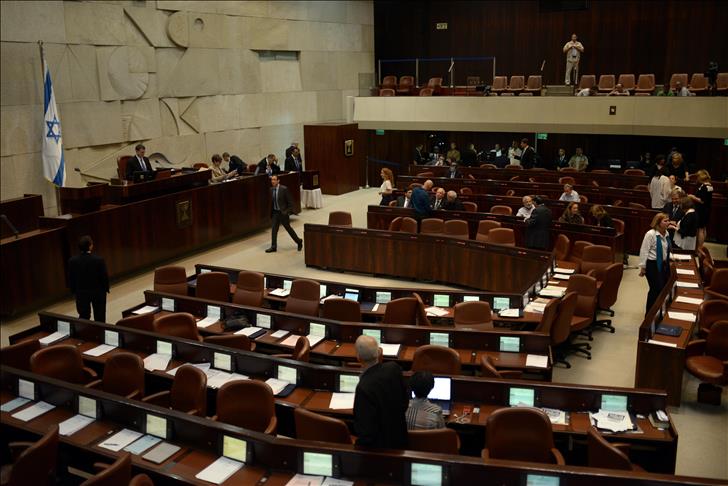Joint list seen as way to boost Arab Knesset clout
"The main objective of this law was to take out the small parties from the Knesset, while strengthening the presence of the big parties," Antoine Shalhat, a Palestinian expert on Israeli affairs, told The Anadolu Agency.

By Anees Barghouthy
JERUSALEM
Last year, the Knesset (Israel's parliament) passed a law raising the electoral threshold form 2 percent to 3.25 percent, a move seen as a blow to the assembly's Arab representation.
"The main objective of this law was to take out the small parties from the Knesset, while strengthening the presence of the big parties," Antoine Shalhat, a Palestinian expert on Israeli affairs, told The Anadolu Agency.
The bill, which passed by a vote of 67-0 in its third reading, was sponsored by Avigdor Lieberman, leader of the ultra-nationalist Yisrael Beiteinu Party, and Yair Lapid, head of the centrist Yesh Atid Party.
The law means parties will need four seats instead of two to be able to have representation in the Knesset.
According to Shalhat, Arab parties were the main target of the law, which could lead to a reduction of their Knesset representation by half.
But surprisingly, the bill could turn in the Arab parties' favor, after they teamed up in a joint list to contest upcoming polls slated for March 17.
The list is comprised of four parties: Hadash (the Democratic Front for Peace and Equality); the United Arab List; Balad (the National Democratic Assembly); and the Arab Movement for Renewal.
In past elections, the four parties – which have different ideologies – vied for Israel's Arab-dominated constituencies separately, and were usually able to clinch up to 3 percent each.
In the previous assembly, Arab parties had secured a total of 11 seats – four for Hadash, three for the United Arab List, three for Balad and one for the Arab Movement for Renewal.
"Formation of the joint [Arab] list dealt a severe blow to the [objective of] the electoral law," Shalhat told AA.
"Instead of 11, the Arabs can win up to 15 seats in the upcoming election, according to the latest Israeli opinion polls," he added, echoing predictions that the joint list would raise turnout among Arab voters.
In 2013 polls, 760,000 Israeli Arabs were eligible to vote but only 57 percent participated, according to Israel's Central Election Committee.
Arab lawmaker Masud Ghnaim of the United Arab List told AA that his party expected an increase in the number of Arab voters this time around.
"In 2013, around 331,000 Arabs voted for the Arab lists. We expect this number to increase by at least 15 percent [in the upcoming polls]," he told AA.
"The idea of a single joint list will encourage the Arab community to participate in the elections," he added.
Around 1.6 million Arabs live in Israel, accounting for roughly 20 percent of the country's eight-million-strong population, according to Israel's official statistics agency.
Israel refers to Palestinians who remained in historical Palestine following the creation of Israel in 1948 as "Israeli Arabs."
Around 5.9 million Israelis in total are eligible to cast ballots in the upcoming Knesset elections, which were prompted by divisions within Prime Minister Benjamin Netanyahu's coalition government.
Unified
Jamal Zahalka, an Arab Knesset member who is running for reelection, said Arab parties had set aside their differences and agreed to present a unified front.
"Formation of the joint list came after consensus was reached among Arab parties on all political and social positions," Zahalka told AA.
"The Arab parties have common goals, the most important of which is to prevent the formation of a new Netanyahu government," he said.
Zahalka asserted that the joint list would not only represent Arab interests in the Knesset, but would also come to represent the third or fourth largest parliamentary bloc.
Arab lawmaker Ahmad Tibi of the Arab Movement for Renewal, for his part, stressed that formation of the joint list was the appropriate response to the increased electoral threshold.
"We believe the Arab parties under the joint list will come to represent the third largest power in the Knesset," Tibi told AA.
"It's a huge blow to those who stood against the presence of Arabs in the assembly," he added.
Anadolu Agency website contains only a portion of the news stories offered to subscribers in the AA News Broadcasting System (HAS), and in summarized form. Please contact us for subscription options.

